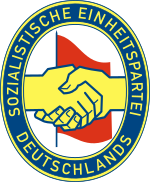 Global Information
Global InformationSocialist Unity Party of Germany information
This article needs additional citations for verification. (December 2017) |
Socialist Unity Party of Germany Sozialistische Einheitspartei Deutschlands | |
|---|---|
 | |
| General Secretary | Walter Ulbricht (first) Egon Krenz (last) |
| Founded | 21 April 1946 |
| Dissolved | 16 December 1989 |
| Merger of | East German branches of KPD and SPD |
| Succeeded by | Party of Democratic Socialism |
| Newspaper | Neues Deutschland |
| Youth wing | Free German Youth |
| Pioneer wing | Ernst Thälmann Pioneer Organisation |
| Paramilitary wing | Combat Groups of the Working Class |
| Labour wing | Free German Trade Union Federation |
| Membership (1989) | 2,260,979[1] |
| Ideology |
|
| Political position | Far-left |
| National affiliation |
|
| International affiliation | Cominform (1947–1956) |
| Colours | Red |
| Anthem | "Lied der Partei" ("Song of the Party") |
| West German affiliation |
|
| Party flag | |
 | |
| |
Politics of East Germany |
|---|
 |
|
The Socialist Unity Party of Germany (German: Sozialistische Einheitspartei Deutschlands, pronounced [zotsi̯aˈlɪstɪʃə ˈʔaɪnhaɪtspaʁˌtaɪ ˈdɔʏtʃlants] ⓘ; SED, pronounced [ˌɛsʔeːˈdeː] ⓘ)[3] was the founding and ruling party of the German Democratic Republic (East Germany) from the country's foundation in 1949 until its dissolution after the Peaceful Revolution in 1989. It was a Marxist–Leninist communist party,[4] established in 1946 as a merger of the East German branches of the Communist Party of Germany and Social Democratic Party of Germany.
The GDR was effectively a one-party state.[5] Other institutional popular front parties were permitted to exist in alliance with the SED; these parties included the Christian Democratic Union, the Liberal Democratic Party, the Democratic Farmers' Party, and the National Democratic Party. These parties were largely subservient to the SED, and had to accept the SED's "leading role" as a condition of their existence. Long one of the most rigidly Stalinist parties in the Soviet bloc, the SED rejected the liberalisation policies of Soviet leader Mikhail Gorbachev, such as perestroika and glasnost in the 1980s, which would lead to the GDR's isolation from the restructuring USSR and the party's downfall in the autumn of 1989.
The SED was officially organized on the basis of democratic centralism. Theoretically, the highest body of the SED was the Party Congress, convened every fifth year. When the Party Congress was not in session, the Central Committee was the highest body, but since the body normally met only once a year most duties and responsibilities were vested in the Politburo and its Standing Committee. Members of the latter were the top leadership of both the party and the state, with the party's general secretary effectively having the authority of a dictator. From 1960, many of them concurrently served on the State Council of East Germany, replacing the President of the German Democratic Republic.
Ideologically, the party, from its foundation, adhered to Marxism–Leninism, and pursued state socialism, under which all industries in East Germany were nationalized, and a command economy was implemented. The SED made the teaching of Marxism–Leninism and the Russian language compulsory in schools.[6] Walter Ulbricht was the party's dominant figure and effective leader of East Germany from 1950 to 1971. In 1953, an uprising against the Party was met with violent suppression by the Ministry of State Security and the Soviet Army. In 1971, Ulbricht was succeeded by Erich Honecker who presided over a stable period in the development of the GDR until he was forced to step down during the 1989 revolution. The party's last leader, Egon Krenz, was unsuccessful in his attempt to retain the SED's hold on political governance of the GDR and was imprisoned after German reunification.
The SED's long-suppressed reform wing took over the party in the autumn of 1989. In hopes of changing its image, it reorganized as the Party of Democratic Socialism (PDS), abandoning Marxism–Leninism and declaring itself a democratic socialist party. It received 16.4% of the vote in the 1990 parliamentary elections. In 2007, the PDS merged with Labour and Social Justice (WASG) into The Left (Die Linke), the sixth largest party in the German Parliament following the 2021 federal election.
- ^ Dirk Jurich, Staatssozialismus und gesellschaftliche Differenzierung: eine empirische Studie, p.31. LIT Verlag Münster, 2006, ISBN 3825898938
- ^ Gabriel Berger: Mir langt’s, ich gehe. Der Lebensweg eines DDR-Atomphysikers von Anpassung zu Aufruhr. Herder, Freiburg im Breisgau 1988, ISBN 3-451-08408-2, S. 42.
- ^ Orlow, Dietrich (29 October 2015). Socialist Reformers and the Collapse of the German Democratic Republic. Springer. ISBN 9781137574169.
- ^ Political Systems of the World. Allied Publishers. pp. 115–. ISBN 978-81-7023-307-7.
- ^ Frank B. Tipton (2003). "East Germany: The structure and functioning of a one-party state". A History of Modern Germany Since 1815. A&C Black. pp. 545–548. ISBN 978-0-8264-4909-2.
- ^ Grix, Jonathan; Cooke, Paul (2003). East German Distinctiveness in a Unified Germany. A&C Black. p. 17. ISBN 1902459172.